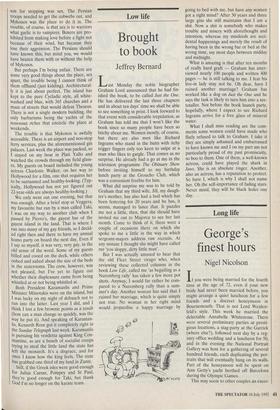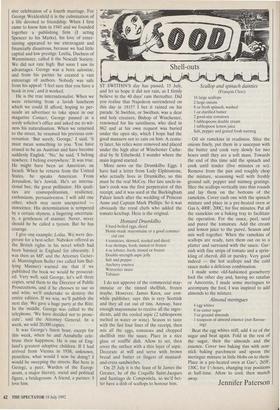Long life
George's finest hours
Nigel Nicolson
If you were being married for the fourth time at the age of 72, even if your new bride had never been married before, you might arrange a quiet luncheon for a few friends and a discreet honeymoon in Bournemouth. That is not Lord Weiden- feld's style. This week he married the delectable Annabelle Whitestone. There were several preliminary parties at presti- gious locations, a stag-party at the Garrick (where else?), followed next day by a reg- istry office wedding and a luncheon for 50, and in the evening the National Portrait Gallery was host for a gathering of several hundred friends, each duplicating the por- traits that will eventually hang on its walls. Part of the honeymoon will be spent on Ann Getty's yacht berthed off Barcelona during the Olympic Games.
This may seem to other couples an execs-
sive celebration of a fourth marriage. For George Weidenfeld it is the culmination of a life devoted to friendship. When I first came to know him in 1945 and we founded together a publishing firm (I acting Spencer to his Marks), his love of enter- taining appeared to me extravagant and financially disastrous, because we had little capital and low prestige. Loelia, Duchess of Westminster, called it the Nescafe Society. We did not rate high. But soon I saw its advantages. George was a born saloniste, and from his parties he created a vast entourage of authors. Nobody was safe from his appeal: 'I feel sure that you have a book in you', and it worked.
He is the true internationalist. When we were returning from a lavish luncheon which we could ill afford, hoping to per- suade an advertiser to take space in our magazine Contact, George paused at a seedy solicitor's office and asked me to wit- ness his naturalisation. When we returned to the street, he resumed his previous con- versation. 'But surely, George,' I said, 'it must mean something to you. You have ceased to be an Austrian and have become suddenly English.' No,' he said, 'I belong nowhere. I belong everywhere.' It was true. He might have been an American, an Israeli. When he returns from the United States, he speaks American. From Jerusalem, he's Jewish. He's an interna- tional bee, the great pollinator. His quali- ties are cosmopolitanism, resilience, enthusiasm, persuasiveness. I will add one other, which may seem unexpected — innocence. His determination is tempered by a certain shyness, a lingering uncertain- ty, a gentleness of manner. Never, never should he be called a tycoon. But he has courage.
I give one example: Lolita. We were des- perate for a best-seller. Nabokov offered us the British rights in his novel which had been banned in England for obscenity. I was then an MP, and the Attorney Gener- al, Manningham Buller (we called him Bul- lying Manner) warned me that if we published the book we would be prosecut- ed. Very well, said George, let's sell three copies, send them to the Director of Public Prosecutions, and if he chooses to sue us and wins, we'll undertake to destroy the entire edition. If we win, we'll publish the next day. We gave a huge party at the Ritz. In the middle, George was called to the telephone. 'We have decided not to prose- cute', said the Attorney General. In a week, we sold 20,000 copies.
It was George's finest hour, except for this week, when he and Annabelle cele- brate their happiness. He is one of Eng- land's greatest adoptive children. If I had arrived from Vienna in 1938, unknown, penniless, what would I now be doing? I would be sweeping the streets. But here is George, a peer, Warden of the Europ- aeum, a major literary, social and political figure, a bridegroom. A friend, a partner. I love him.



















































 Previous page
Previous page